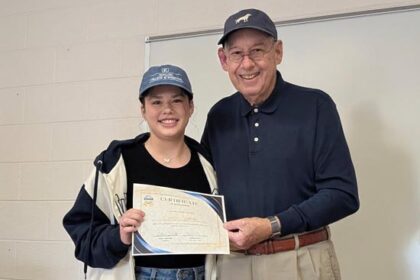Ginseng has been harvested for medicinal and commercial purposes in the Appalachian Mountains of western North Carolina for as long as human beings have lived in the area. Due to this cultural and natural history, Mars Hill University attempts to grow a small amount of ginseng on its campus for educational purposes.
Unfortunately, raising plants to maturity has proven difficult because the ginseng has been repeatedly stolen.
Now, the university hopes to solve that problem with dye. Grounds Supervisor Mark Norwood has worked with the U.S. Department of Agriculture to obtain a dye which is particular to the university. Any dyed ginseng poached from the university campus, Norwood said, will be both easy to identify and difficult to sell.
“Dye on the ginseng roots does not harm the plant and yet it greatly reduces its value. In fact, no reputable dealer will purchase dyed ginseng,” Norwood said. “So, people should know that if they take ginseng from the campus, they cannot sell it. Furthermore, the particularity of the dye, which cannot be washed off, would make it relatively easy to prosecute anyone caught with plants poached from the campus.”
Norwood, a biologist by training, makes a practice of growing native plants on the university campus. His goal is to create a natural atmosphere at the university that is not only lovely, but also reflects the natural environment of the region.
“Ginseng is a native species, and it has been so integral to the history of the region, it is important to grow it here,” Norwood said. “I would like to see biology or regional studies classes who talk about the role of ginseng in the Appalachian mountains be able to walk outside and see what it looks like.”
Norwood also fears that, if overharvesting of ginseng continues, students and community members may not be able to see ginseng in its natural habitat. That makes it all the more important that an institution like Mars Hill works to preserve the plant.

“Growing ginseng on the Mars Hill campus is just one small way to try to work against the decimation of this species,” he said.
Eventually, Mars Hill hopes to create an arboretum of native wild plants and design programs around them, according to Dr. Karen Paar, Director of Regional Studies.
“I see the cultivation of ginseng on campus as part of an effort to make this campus a rich educational environment. The Ramsey Center is interested in working with Mark Norwood and the Biology Department to document the trees and other plants on this campus and to obtain nationally recognized arboretum status. Future plans include having a program or programs related to ginseng and other important wild plants from this area,” Paar said.
Such plans depend, of course, on keeping the ginseng in the ground.
According to Ross Young, Director of the Madison County Cooperative Extension Service, ginseng is a slow-growing native plant which has long been prized in Madison County for both its medicinal and commercial value. Even before white settlers came to the Appalachian mountains, the Native American people who lived in the region gathered ginseng. European settlers followed in their footsteps and the practice continues to the present day.
Young said that while some Madison County residents use ginseng themselves, most of the ginseng gathered locally ends up being sold to China, a country which long ago overharvested and decimated all its native ginseng. Because gathering ginseng is a family tradition for many people in the area, some may not think about the legal limits to the practice, nor about the severity of penalties for poaching, he said.
“The only way to gather ginseng legally is to do it on your own land, on the land of a landowner who has given you written permission, or on public land for which you have a permit,” Young said. In most other situations, poaching ginseng is a felony, he said.
That has been the law for some time, but earlier this year for the first time, a Boone, N.C., man was convicted of a felony for poaching ginseng from private land.
Ginseng’s long term of growth – it can take up to ten years for a plant to reach its full value – makes the plant vulnerable to overharvesting. Furthermore, the plant’s value and vulnerability to theft makes it difficult for people to grow ginseng as an agricultural crop.
“Ginseng could be a profitable agricultural crop which could help fill the void left by tobacco in Madison County,” Young said. “But I can’t recommend it to people, because of the likelihood that it will be stolen before it’s ready to harvest. I hope the recent prosecution of a poacher in Boone will make people realize the seriousness of poaching ginseng.”
Mars Hill University is a premier private, liberal arts institution offering over 30 baccalaureate degrees and one graduate degree in elementary education. Founded in 1856 by Baptist families of the region, the campus is located just 20 minutes north of Asheville in the mountains of western North Carolina. www.mhu.edu









